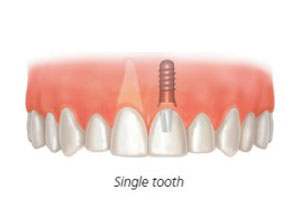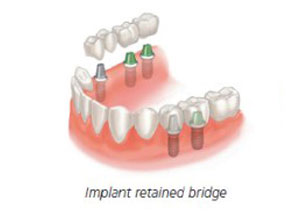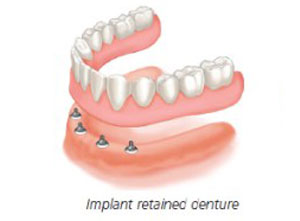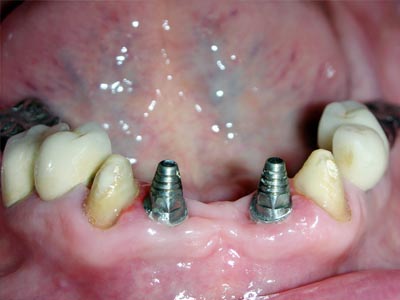Dental implants are the future in dentistry and are becoming more and more widely used by dentists across the globe. Dental implant success rates have sky rocketed in the past few years and people are finding comfort and confidence again in replacing their missing teeth with dental implants.
Improved Comfort
Dental implants eliminate the pain and discomfort of removable full or partial dentures. Since dentures sit on top of the jawbone and gums, continuous shrinkage of the jaw bone alters the fit of the denture resulting in slipping or rocking of the dentures. Exposed nerves and irritation of the gum tissue may add to the discomfort.
Implant supported replacement teeth are like natural teeth because they are anchored securely to your jawbone. Gum irritation and the pain of exposed nerves associated with conventional full or partial dentures are eliminated.
Improved Speech
With ill fitting dentures, the teeth slip and slide around the mouth. The facial muscles become tense in an attempt to hold the teeth in place. This often results in mumbling, slurred speech or clicking noises. Implant supported replacement teeth allow you to speak with confidence in a relaxed and natural tone.
Overview
Crowns and conventional bridges or dentures may not be your only options when replacing missing teeth. For some people, dental implants offer a smile that looks and feels very natural. Surgically placed below the gums over a series of appointments, implants fuse to the jawbone and serve as a base for individual replacement teeth, bridges or a denture.
Implants offer stability because they fuse to your bone. Integration of the implants into your jaw also helps your replacement teeth feel more natural and some people also find the secure fit more comfortable than conventional substitutes.
Candidates for dental implants need to have healthy gums and adequate bone to support the implant. A thorough evaluation by your dentist will help determine whether you are a good candidate for dental implants.
Yes. Dental implants can provide artificial teeth that look natural and feel secure. Dental implants can also be used to attach full or partial dentures. Implants, however, are not an option for everyone. Because implants require surgery, patients must be in good health, have healthy gums, have adequate bone to support the implant and be committed to meticulous oral hygiene and regular dental visits. If you are considering implants, a thorough evaluation by your dentist will help determine if you would be a good candidate.
First, surgery is performed to place the anchor. Surgery can take up to several hours, and up to six months may be required for the bone to grow around the anchor and firmly hold it in place. Some implants require a second surgery in which a post is attached to connect the anchor to the replacement teeth. With other implants, the anchor and post are already attached and are placed at the same time.
After the gums have had several weeks to heal, the next step is begun. The artificial teeth are made and fitted to the post portion of the anchor. Because several fittings may be required, this step can take one to two months to complete.
Implant surgery can be done either in a dental office or in a hospital, depending upon a number of factors. A local or general anesthetic may be used. Usually pain medications and, when necessary, antibiotics are prescribed. Your dentist will give you instructions on diet and oral hygiene.
A dental implant is an artificial tooth root (synthetic material) that is surgically anchored into your jaw to hold a replacement tooth or bridge in place. The benefit of using implants is that they don't rely on neighboring teeth for support, they are permanent and stable. Implants are a good solution to tooth loss because they look and feel like natural teeth.
Implant material is made from different types of metallic and bone-like ceramic materials that are compatible with body tissue. There are different types of dental implants: the first is placed directly into the jaw bone, like natural tooth roots; the second is used when the jaw structure is limited, therefore, a custom-made metal framework fits directly on the existing bone.
Strategically placed, implants can now be used to support permanently cemented bridges, eliminating the need for a denture. The cost tends to be greater, but the implants and bridges more closely resemble real teeth.
Talk with your dentist about whether you are an implant candidate. You must be in good health and have the proper bone structure and healthy gums for the implant to stay in place. People who are unable to wear dentures may also be good candidates. If you suffer from chronic problems, such as clenching or bruxism, or systemic diseases, such as diabetes, the success rate for implants decreases dramatically. Additionally, people who smoke or drink alcohol may not be good candidates.
The dentist must perform surgery to anchor the "artificial root" into or on your jaw bone. The procedure is done in the dental office with local anesthesia. Medications may be prescribed for soreness.
The process can take up to nine months to complete. Technology, however, is trying to decrease the healing time involved. Each patient heals differently, so times will vary. After the screws and posts are placed surgically, the healing process can take up to six months and the fitting of replacement teeth no more than two months.
The success rate for implants depends on the tooth's purpose and location in the mouth. The success rate is about 95 percent for those placed in the front of the lower jaw and 85 percent for those placed in the sides and rear of the upper jaw.
Your overall health may affect the success rate of dental implants. Poor oral hygiene is a big reason why some implants fail. It is important to floss and brush around the fixtures at least twice a day, without metal objects. Your dentist will give you specific instructions on how to care for your new implants. Additional cleanings of up to four times per year may be necessary to ensure that you retain healthy gums.
Since implants involve surgery, they cost more than traditional bridge work. However, some dental procedures and portions of the restoration may be covered by dental and medical insurance policies. Your dentist can help you with this process






